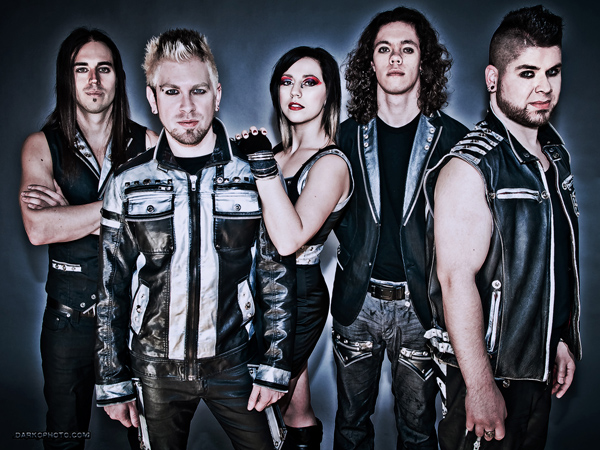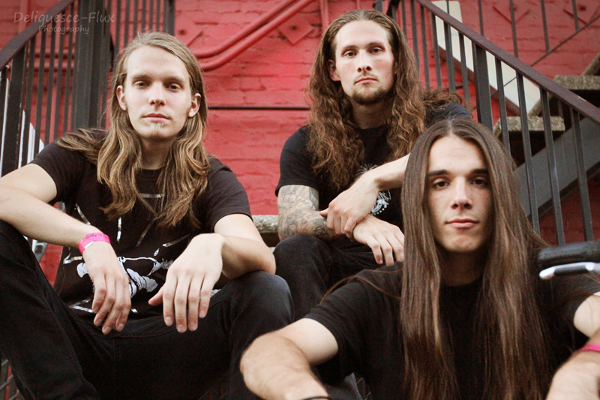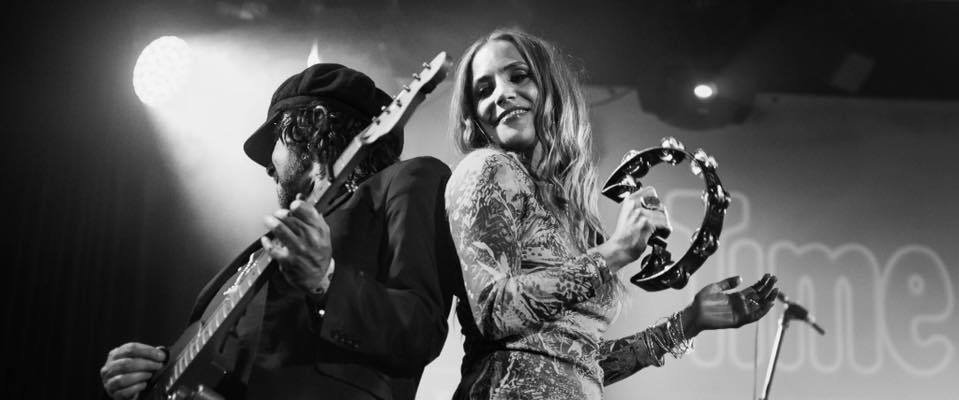by Alissa Ordabai
– Senior Columnist —
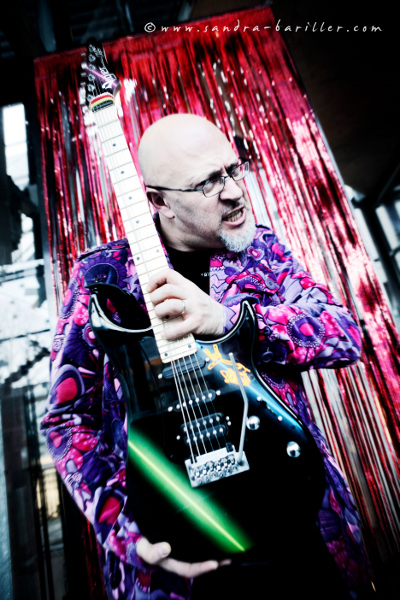 The most eccentric insurrectionist to ever come out of heavy metal, Christophe Godin has been laughing in the face of the genre’s conventions and the industry’s expectations ever since the release of his band’s debut record in 1998. The band’s name was – as is – Mörglbl, a moniker as wacky and as bewildering as the act itself, which from day one defied money-making show biz culture by setting all-out self-expression as its ultimate goal.
The most eccentric insurrectionist to ever come out of heavy metal, Christophe Godin has been laughing in the face of the genre’s conventions and the industry’s expectations ever since the release of his band’s debut record in 1998. The band’s name was – as is – Mörglbl, a moniker as wacky and as bewildering as the act itself, which from day one defied money-making show biz culture by setting all-out self-expression as its ultimate goal.
Renouncing categorisation, unable to stand boredom, and never interested in following a beaten path, Godin has been channeling his dizzifying virtuoso guitar chops into metal, jazz, funk, and whatever else he likes, fusing them into an eclectic – yet instantly recognisable as uniquely his – mixture of styles.
Some say that he could have become one of the top deities of the Mount Olympus of metal with his gift for writing big, space-rocking riffs and instant-grip melodies. But stardom – although always attainable – has never attracted him if it meant not being fully himself.
And being Christophe Godin includes more than having A-grade chops and a perfect grip on rock songwriting. Equally interested in jazz, crazy chords, and complex harmonic progressions, he likes to break boundaries, and to stretch wider than any given genre would allow him. Plus Godin – unlike the majority of heavy metal musicians – has never taken himself too seriously, managing to use travesty and absurdity alongside with reflection to convey his inner realities.
Having released 6 albums with Mörglbl to date, Godin has also been devising other projects – simply because even Mörglbl’s latitude felt too cramped to him at times. One of his most recent ventures is a band called Gnô – a prog-metal outfit where complex rhythmic patterns and sprawling guitar solos at most unexpected moments give way to Godin’s prankish punk leanings. There have also been duos Godin took part in, including the one with flamenco guitarist Olivier-Roman Garcia who together with Godin engages in calm and sophisticated – and utterly virtuosic – jazz-meets-rock-meets-flamenco acoustic guitar extrapolations.
Still, none of Godin’s ventures outside of Mörglbl is better at pulling all the stops as his Metal Kartoon project. Bringing together metal and jazz in a wacky, highly charged way, Metal Kartoon is all about through-composed tracks and barn-burner guitar leads, outrageous harmonic detours, and high-powered blitz attacks against the familiar and the routine.
Earnestness and goofiness, jazz and metal, the high-brow and the low-brow co-exist in Godin’s music so organically that you instantly know he would not fare well within the strict confines of metal. Bored with preset blueprints, Godin always portrays the reality itself, bypassing the clichés and the formulas that are supposed to signify it. But despite his music being a hodgepodge of many styles, there is a coherent impulse at the bottom of it, and he doesn’t use humor and absurdity to masque or avoid serious themes. If anything, he uses them to maintain his authentic stance towards reality.
According to Godin, the multi-faceted character of his work reflects the complexities of everyday life. “How many times do you get excited, happy, angry, confused, or overwhelmed during the day?” he asks. To convey this multiplicity of real life is the not an easy task he says – a tough balancing act which calls not only for a knack for representation, but also observation.
And Godin is a sharp-eyed observer. Having worked at one point as a cartoon draftsman for an advertising company, he to this day feels connected with the cartoon culture and its visual imagery. The picto-grammatical nature of the way he writes music sometimes resembles a cartoon strip with one distinct musical scene following another, unfolding step-by-step the narrative, the representation of character, and dramatic action.
But no matter how vivid and amusing this method is, it still doesn’t define Godin as a musician. His astounding gift for improvisation if perhaps his most striking feature where his knowledge of both jazz and rock allows him to respond intuitively, but with an extraordinarily sharp focus and sense of form. Direct emotional connection is what his improvisation is all about – devoid of filler notes, eloquent, and capable of taking you outside of the everyday continuum.
Mörglbl’s latest record Brütal Römance released earlier this year distils Godin’s approach to its fundamentals, with protean songwriting finding an extra dimension through his extensive guitar leads. The sound on the new release is starker and the production is simpler than before, but the layered meanings of different genres and moods are as richly theatrical as ever, with the ultimate purpose – exploration – presiding over the proceedings.
Given the variety of Godin’s interests and the number of projects he’s involved in, this release seemed a good starting point for our conversation when Hardrock Haven finally gets the long-awaited chance to speak to the French guitar hero. Catching up with Godin in London where he was shooting a series of instructional guitar videos last month, HRH was stoked to hear about the making of the album, the touring which preceded it, as well as to get into more in-depth subjects such as the changes in the world of rock guitar over the past few decades.
The time is 5 pm – traditional time for tea in England – but Godin and this writer are heading straight to the pub near Godin’s hotel in King’s Cross. The conversation is accompanied by Guinness and is punctuated by bursts of deafening noise emanating from the adjacent room where a local band’s sound check is in full swing, counterpointed by the top 10 blaring from the speakers behind the bar. But Godin remains unperturbed, at ease and in his hallmark humorous mood, only occasionally wondering if Hardrock Haven’s Dictaphone is really capable of picking out his voice from the aural inferno which surrounds us.
Christophe Godin The Interview
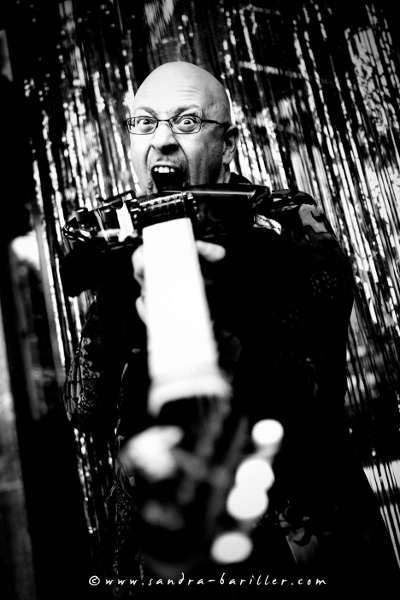 Hardrock Haven: Christophe, thank you very much for agreeing to do this interview with us.
Hardrock Haven: Christophe, thank you very much for agreeing to do this interview with us.
Christophe Godin: My pleasure!
HRH: We really appreciate your time. And congratulations on the new album!
CG: Did you enjoy it?
HRH: What a fantastic record!
CG: You did? Oh, thank you.
HRH: Are you happy with the way this release has turned out?
CG: I think that is by far the best Mörglbl release that we’ve done because for the first time we really had a lot of time, we had the time to tour the U.S. before we finished the record, so we kind of played it a lot of times on stage, and we were still working things out with composition and the arrangements, and when we went back home it was very easy to finish the record because we knew exactly where we were going, and that was for the first time. Most of the time it’s the other way around – you compose, you record, and then you go on tour, and sometimes there are things that don’t work that good. But that wasn’t the case this time.
HRH: How long did it take you to go from scraps of initial ideas to finished product?
CG: Maybe I would say 4 months. We are a strange band because at first we booked a house for one week, and we played whatever was just coming out. And then we all came with little ideas, and we didn’t know where we were going. We were just recording tonnes of ideas. Then we forgot about it for about a month, and did another session where we assembled all the ideas together to structure some songs. At that moment they didn’t have titles, they just had strange names… Well, actually, they DO have strange names, but they already had strange names.
HRH: Very humorous names, aren’t they? (Laughs).
CG: Yeah, whatever! (Laughs). Then we recorded demos, went on tour, and then we recorded. So it was a strange schedule, but I would like to do that again with the upcoming releases because I felt really comfortable with that process. It does make sense where you first try some ideas on stage and see people’s reaction, and then you can delete things that don’t work and add some things that work better. So I’m happy with it.
HRH: When you write, do you think in terms of entire composition and have the basic compositional outline from the very start, or do you sometimes glue bits and pieces together written at different times?
CG: Sometimes we glue things together, but sometimes live there are new things coming out. We record all concerts just to have ideas. There are changes from the way songs sound on the demo and the way they end up on the recording, and sometimes the difference is huge, as was the case on this one.
HRH: Did you set yourself any technical challenges on this album?
CG: You mean as a guitarist?
HRH: As a guitarist. Where there parts that you had to practice for a while before recording them in the studio?
CG: The idea which I stuck to was to make as few takes as possible. That’s why we toured first, because as I went into the studio – my home studio where I did all the guitars – I tried to have something fresh coming out of the guitar without going through many takes until you find something good and you recreate something… I really played live and most of the solos are improvisations.
HRH: So all of your solos are improvised?
CG: They are all improvised and most of them are the first or the second take.
HRH: That’s astounding.
CG: But that’s because we toured a lot and I was just comfortable with the songs and I didn’t really think what I was playing.
HRH: This is extraordinary.
CG: Well… That’s who we are. Mörglbl is a metal band but with a jazz attitude. And the fact that something can be new every night with different interpretations of the solos – that makes it interesting to me, and that’s what we try to capture on that record. On the previous releases some solos were double-tracked, some arrangements and everything. This one is a much more rougher version of what Mörglbl can be live.
HRH: The approach of the band where you mix metal riffs, jazz improvisation, and occasional bits and pieces of pop music – is this something which you had to initially sit down and construct on an intellectual level, or is this something which came to you naturally?
CG: I think it came naturally because of the cultures of the band members. We all come from different areas: Ivan (Ivan Rougny, bass player – AO) is more a funky kind of guy, Aurélien (Aurélien Ouzoulias, drummer – AO) is more a metal drummer using a lot of double bass pedal and everything, and he has culture of a 30 year-old guy, and I am more of a… You know, I listen to a lot of very sophisticated fusion guitarists, and I love Pantera and Meshuggah, and all those in-your-face riffs. So it all came very naturally together that everyone brought their culture into the music of the band.
HRH: People sometimes say that you are one guy who could have become a mega-star of heavy metal just on the sheer strength of your ability to write huge epic riffs and match them with incredible solos that are so eloquent, and so accessible. The epitome of what metal is about. And at the same time you never had an interest in pursuing that path.
CG: I ruined everything dropping in some jazz lines and sophisticated chords! (Laughs). But – actually – I’m not looking for stardom whatsoever. I’m looking for something…. You know, I’m playing something like 180 gigs a year, and if one day I go on stage and get bored with what I’m playing, and I don’t find it interesting, I’d stop the next day. That’s what I like about that music. My culture is metal, but I want to be a little more challenging for myself and for people listening to the music. It’s cool to see people headbanging, but all of a sudden they go wrong because there is a rhythm change, and they question themselves, “What’s just happened, I don’t get it.” I like this idea. And I’m not against the idea of one day being a guitarist in a very straightforward metal band, but at the moment Mörglbl is in my blood and what makes my music breathe.
HRH: Did you ever have to struggle with striking a balance between being accessible and expressing your true inner self?
CG: That’s always the problem with Mörglbl, actually. And probably it’s the right balance that we found on this album. Because a lot of my friends who are not into music finally are finding it acceptable to listen to that record. And they would just reject completely the first releases.
HRH: No way! Those are brilliant records!
CG: Thank you, but it was going a little too far at times. This time the format of the songs is a lot more accessible. There are still long pieces here and there, but maybe 3 songs out of 11, so I think now I think we have that balance to make it a little bit more accessible. Hopefully.
HRH: Does your music ever surprise you? Do you ever listen back to music that you wrote or a guitar solo that you did and go, “I didn’t know there was this aspect to my character?”
CG: (Laughs). Probably when I listen back to the things I played when I was 20 and I was way more technical than I am now. Because when you’re young…. and I’m a very old guy now, I can only play blues licks now, I’m 72… (Laughs). No, actually, when I was young, I was spending 6 to 7 hours a day practicing the guitar, and you feel like a Superman, you can play whatever you want… Now I have a family with two kids, so when I’m not touring around the world, I have to take care of them, and – of course – I am spending less time with the guitar. So when I listen to the old demos I surprise myself and I just get frustrated because I can’t play as good as I did before… Well, not “as good,” but as technical.
HRH: But then again, people often confuse technique with speed…
CG: True.
HRH: … whereas you can play very fast, and still have bad technique, or you can play slow-tempo with first class technique which is instantly apparent.
CG: Completely. It’s rare to hear that, and I really appreciate to hear it from you because a lot of people think that the faster you play, the better you are. And – actually – now, with time, I’ve found the right balance of dropping in some shred guitar, but at the same time being emotional on long notes that you let ring, and finding balance between melody and fast things. I can still play a little bit of fast stuff, but not too long. (Laughs).
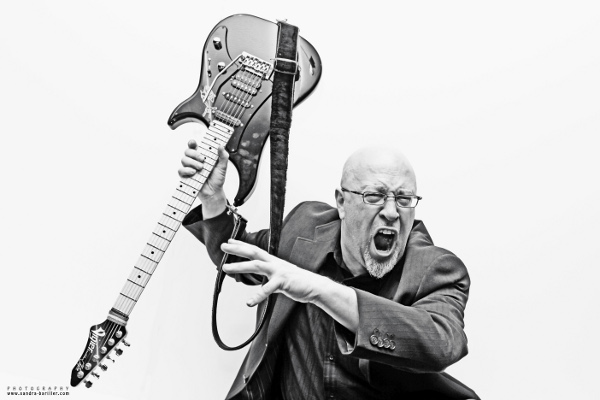
HRH: In your previous interviews you say that you started playing at 13.
CG: Yes.
HRH: Did you have a clear musical goal or ambition when you were just starting out?
CG: I always wanted to be a professional. It’s funny – right from day one. I’ve discovered electric guitar through my sister’s and brother’s albums that they were listening to. I saw Ted Nugent on stage when I was 13, and I saw that guy half-naked on stage, with long hair, playing really loud, and I said to myself, “This is what I want to do!” Look at me now – I have no hair! (Laughs).
HRH: You wanted to be Ted Nugent!! (Laughs). No way!
CG: Well… And at the same time I discovered AC / DC’s Back in Black, the first Van Halen record, and Jean-Luc Ponty’s Enigmatic Ocean who was a violinist with Allan Holdsworth. And all that mixed together made it obvious to me that I wanted to be a professional guitarist and to play rock. My mother was very disappointed. But we had a deal where I had to finish high school and everything, and then I went to be what I am now – playing all around the world. But from day one that was the goal.
HRH: Do you ever play for yourself? Not for practice, not for anybody else, but purely for your own enjoyment?
CG: I think this is what I am doing one hundred per cent of the time. I mean, I have no boss, I don’t play for anyone else who is telling me what to do. I’m a sophisticated punk in way (laughs) because what we do is out of all commercial trends, out of mainstream, and we really do things that we want to. We never compromise ourselves. So at the end of the day I’m playing whatever I want and I am enjoying it one hundred per cent. I’m a happy boy.
HRH: You are one of very few guitarists I’ve interviewed to say this.
CG: Really?
HRH: A lot of them say it’s a profession and it’s hard for professional musicians to keep that initial spark.
CG: It’s a job. (Laughs). But when you can mix together passion and job, you get full enjoyment. I get paid for playing my own music. If you don’t enjoy it, going for a regular job would make you happier. The funny thing is that just before this interview I was in the hotel room just playing the guitar. Watching TV and playing the guitar. Not practicing – playing. Just something that would please my ears, and that was it.
HRH: It’s probably difficult for a professional musician to keep that feeling.
CG: It’s probably difficult when you have pressure and when you are into the business. I’m endorsed with companies that like my music and let me play whatever I want. I’m playing in a few projects where we do what we like to do. For example, Gnô which is my Pantera-meets-the-Beatles kind of stuff. I have Mörglbl which is a strange fusion / metal kind of thing, and I have an acoustic duo with a flamenco guitarist. And with those three things I can play all around the world all year. That’s my life. What else could I dream of? So playing is full enjoyment all the way through.
HRH: Would you define yourself as a popular music guitarist? As opposed to a classical guitarist?
CG: I’m a fusion / rock guitarist.
HRH: Would you say the profession of a rock guitarist has changed in any fundamental way since the time when you were starting out? Not in terms of technology or in terms or distribution, but in terms of pure craft. Do you think there are now more requirements of rock guitarists these days or less?
CG: Probably more because we are much more numerous now than we used to be. When you don’t belong to a certain style of music, you have to struggle to exist because there are fewer and fewer places where to play music and more and more musicians. But at the same time thanks to YouTube the thing has become much more accessible to the whole world, so I can play in different countries all over the world which I couldn’t do when I was younger. It’s a strange balance, but things have changed. On the personal level they haven’t changed that much because I always play my own stuff. The thing is that the playground is much bigger now because it’s now all over the world, and it was just in my country or in Europe when I was younger. But I think it has changed, but we can still adapt and we can find… It’s a tough question, actually, but yes, it has changed.
HRH: Do you think there is now pressure to know theory, and to have amazing chops, and to be fluent in other genres apart from your chosen one? Now more so than before?
CG: Probably people are a lot more educated about music than they used to be about music. So probably they expect things to be tighter, maybe more sophisticated and better played than in the 70s if you compare.
HRH: Or the 60s.
CG: Or the 60s. Yes, probably there is bit more pressure. But at the same time the technology has made instruments way easier to be played. So in a way what you were struggling for in terms of technique, you don’t have to now. But probably the fact that people are more educated than they used to be puts more pressure on the musicians. Once again, if you are 20 years old and you practice to be a better musician… I honestly never feel any pressure when I go on stage. Because I think I did all I could before to play as good as I can. And if you don’t like it, just don’t come to the show. But if you like it, just have fun with us. That’s the balance to find.
HRH: Talking about France, is there a thriving guitar community in France, is it a supportive environment?
CG: It gets better. But I would say that France is probably is not the country for rock. We don’t have a strong background… When I come to the UK, I’m always surprised when I’m listening to the radio and walking around and listening to the music in bars and everything. There is music everywhere – you can find rock, you can find…
HRH: Jazz.
CG: Yeah, many different styles everywhere. In France it’s more like French pop music, not much rock, not much metal. Fortunately, we have Gojira which is getting bigger and bigger, and they make people aware that we can have good metal bands in France. So people get to listen to it more. So France is definitely a tough country. But I was lucky enough to have started 20 years ago, so people are aware of my existence, and we don’t have a lot of problems putting up a Mörglbl tour. So I’m safe now. It’s the only cool thing about being old. (Laughs).
HRH: You have very briefly mentioned in one of your previous interviews your interest in Gotlib and in cartoons. How can you translate something which is visual into music? What is the dynamics of that?
CG: You can easily think of a composition as a soundtrack to something visual. And when I compose sometimes it’s funny because I have graphic – or cartoonish – ideas coming out. For example, on my Metal Kartoon album “Dance of a Fat Boy” the first time I composed that riff, the first time it came out I was playing a show in Frankfurt and I saw a very big guy coming, dancing to the kind of music I was doing. And that riff came to my mind. So I did the kind of soundtrack to what he was doing. That was the idea. And sometimes it’s funny – when I’m composing songs, I’m writing a little story and still draw cartoons when I have time. That was my job, actually, I started with this.
HRH: I didn’t know that!
CG: I did advertising as a draftsman, and I was drawing cartoons for companies and everything, whatever. And I still do it sometimes in the corner of a table sometimes. And sometimes when I’m composing I have those ideas and I’m just writing out some lines and drawing some cartoons, and it becomes alive, and the connection between the music and the graphics is obvious at that moment.
HRH: That’s amazing. Generally, metal as a genre tends to take itself very seriously…
CG: I don’t! (Smiles).
HRH: And there is not much room for irony or self-irony.
CG: I know. Unfortunately, I have to agree. That’s what I like about bands like Diablo Swing Orchestra or The Dillinger Escape Plan. Those bands are not really serious, but the way the play music is really serious. Frank Zappa was that way too. You can listen to Zappa and he’s just amazing, but you smile while listening to him.
HRH: He was sarcastic whereas you are just ironic.
CG: He took it a little bit too far! (Laughs). But I think music is here to have a good time and enjoy yourself. I’m not into being too serious about myself, that’s not the way in everyday life, and I wouldn’t try to be an average rocker trying to be something he is not. Music has to be a reflection of what you are, or it doesn’t work. Mörglbl is now 16 years old, and I think that the reason why we have been doing it for 16 years is that we’ve always been true to ourselves. We’ve never tried to be the next trend. We don’t follow trends, and we are completely independent, and we play what we are.
HRH: What would your advice be to anyone who is just starting out on the guitar?
CG: Never to forget that the guitar at first is a rhythm instrument. A lot of guys want to go through very intricate lines and play very fast and everything. First of all, play tight, know as many chords as you can, know as many songs as you can, try to play with people, try to listen to the drummer because most guitarists forget about it. I think the better rhythm guitarist you are going to be, the better overall guitarist you will be. If you are very tight with rhythm, then your solos will be much more interesting. And they will be tighter too. Because if you are aware of the beat, then you know where you are going.
HRH: A lot of people say that you have to listen to Hendrix as a rhythm guitarist so see where his solos spring from.
CG: Of course. Listen to Van Halen. For a lot of people he is the most fantastic guitarist of the 80s. He is. But he is also probably the best rock rhythm guitarist of that era. Because when you listen to the first two Van Halen records, they are just amazingly tight rhythmically, and he plays so tight with the drummer.
HRH: Maybe it was a blood thing.
CG: Yes, probably.
HRH: I have one last question. It’s a bit goofy, I hope you don’t mind.
CG: Well, I’m a goof, no problem! (Laughs).
HRH: If you were given an answer to any question in the universe, what would you ask?
CG: That’s a tough question! I’m back in year one! What would I ask? Why do strings break?

